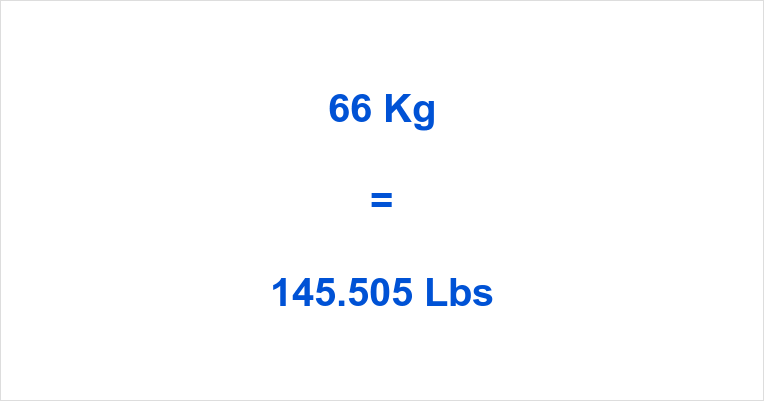Introduction
Ever wondered how much 66kg is in lbs? Whether you’re planning a workout, tracking your weight, or just satisfying your curiosity, knowing how to convert kilograms to pounds is handy. In this blog, we’ll break down the simple math behind this conversion, why it’s useful, and answer some common FAQs.
By the end of this post, you’ll not only know the answer but also gain some interesting insights into weight conversion and why different measurement systems exist.
Let’s dive in!
66kg in lbs – Quick Answer
The simple formula to convert kilograms (kg) to pounds (lbs) is: Pounds=Kilograms×2.20462\text{Pounds} = \text{Kilograms} \times 2.20462Pounds=Kilograms×2.20462
So, if we apply this to 66kg: 66×2.20462=145.5 lbs66 \times 2.20462 = 145.5 \text{ lbs}66×2.20462=145.5 lbs
So, 66 kg is approximately 145.5 lbs.
If you’re looking for a quick way to estimate:
- Multiply the kilograms by 2.2 to get a rough idea.
- Use an online converter for exact numbers.
Why Convert Kilograms to Pounds?
The metric system (kilograms) is widely used around the world, but in countries like the United States, people use pounds instead. Here’s why weight conversion is useful:
For Fitness & Health Tracking
If you follow a fitness program from an American trainer but live in Europe, you might need to convert weights frequently.
For Travel & Immigration
Some visa applications and medical forms ask for weight in pounds.
For Shopping & Cooking
In some cases, food packages display weight in kg, but recipes might mention pounds.
For Sports & Weightlifting
Athletes and bodybuilders often deal with weights in both kg and lbs, depending on competition standards.
How to Easily Convert Between Kilograms and Pounds
If you’re not great at math (or just don’t feel like doing it), here are two quick tricks:
1. Mental Approximation (Quick & Easy)
- Multiply by 2.2 → Example: 66 × 2.2 ≈ 145.2 lbs
- This gives you a close estimate.
2. Use a Conversion Chart
Here’s a simple table for easy reference:
| Kilograms (kg) | Pounds (lbs) |
|---|---|
| 60 kg | 132.3 lbs |
| 62 kg | 136.7 lbs |
| 64 kg | 141.1 lbs |
| 66 kg | 145.5 lbs |
| 68 kg | 149.9 lbs |
| 70 kg | 154.3 lbs |
Bookmark this table, and you’ll never struggle with conversions again!
Understanding Kilograms vs. Pounds
Ever wondered why some countries use kg and others use lbs? Here’s a little history lesson:
- Kilograms (Metric System) – Used in most of the world, including Europe, Asia, and Africa.
- Pounds (Imperial System) – Commonly used in the USA, UK, and a few other countries.
- Why the Difference? The metric system is based on simple calculations (multiples of 10), while the imperial system is more traditional and dates back to older measurement systems.
Despite the differences, both systems work—it’s just a matter of knowing how to convert between them.
Conclusion
Now you know that 66kg is approximately 145.5 lbs! Whether you’re using this for health tracking, fitness, travel, or just general knowledge, conversions like these can be incredibly useful.
Want a quick trick? Just multiply by 2.2 for a fast estimate. Need precision? Use the formula: kg×2.20462=lbs\text{kg} \times 2.20462 = \text{lbs}kg×2.20462=lbs
If you found this guide helpful, share it with a friend who might need it too!
FAQs
1. Is 66 kg considered overweight?
It depends on your height and body composition. BMI (Body Mass Index) can help determine if your weight is in a healthy range.
2. How do I convert lbs to kg?
Use the formula: Kilograms=Pounds÷2.20462\text{Kilograms} = \text{Pounds} \div 2.20462Kilograms=Pounds÷2.20462
For example, 145.5 lbs ÷ 2.20462 ≈ 66 kg.
3. Which countries use kg vs. lbs?
Most of the world uses kg, except for the USA, Liberia, and Myanmar, which primarily use lbs.
4. Is 66 kg heavy for a woman?
It depends on height, muscle mass, and body type. For some, it’s a healthy weight, while for others, it may be on the higher or lower end.
5. What’s the easiest way to convert between kg and lbs?
Multiply kg by 2.2 to get lbs.
Divide lbs by 2.2 to get kg.











